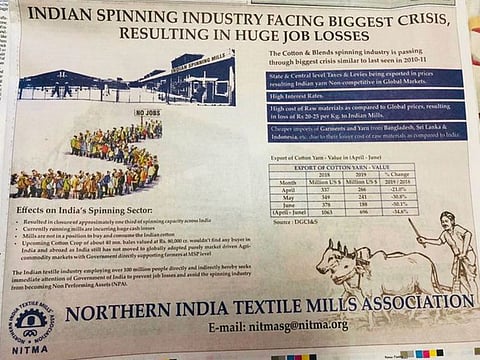Indian textile body uses newspaper ad to get government attention
India’s textiles association issues ad in newspaper begging government’s attention

A tweet said it all. The Indian government is so focused on everything else but the economy that an industry body had to issue a newspaper advertisement to get their attention.
Indian filmmaker @VinodKapri tweeted: “When TV media day and night live in search of Ram Laxman Hanuman’s Sanjivani, are besotted by Sapna Chaudhary’s dance moves, are constantly focused on Pakistan, then the industries facing the biggest crisis have to advertise in the newspaper and beseech: ‘We are in deep trouble, save us.’”
The Indian Express carried an advertisement by the Northern India Textile Mills Association (NITMA) on Tuesday, which went viral on social media. It was titled: ‘Indian Spinning Industry Facing Biggest Crisis, Resulting in Huge Job Losses’.
Why is this a big deal?
The textile Industry in India is the biggest employer after the agriculture industry.
According to NITMA this industry is facing the worst financial crisis and slowdown, forcing spinning companies to cut down their production and shut down their mills. This will result in job losses and add to the already high unemployment rate in the country.
Many tweeps said it was high time the Indian government did something about it.
@satz_msd tweeted: “These appeals from Indian spinning industry association are first of their kind. It is an open request to government of India and concerned state governments to heed to their demands on tax rebates, interest, subvention and making exports competitive.”
And, @somyalakhani added: “The cotton and blends spinning industry is passing through the biggest crisis, similar to the one seen in 2010-11. A full page notification across newspapers about ‘huge job losses’ in the Indian spinning industry with an appeal to the government.”
An economic crisis in India?
Much of the debate in recent months has been focused on the sharp loss of economic momentum in India.
A leader of the opposition Congress party, Priyanka Gandhi Vadra did not lose the opportunity to tweet: “These advertisements reveal the reality of the BJP government’s claims about the economy. Till now, industrial organisations used to advertise that we are moving forward. Under the BJP government’s rule, many have to advertise and say that we are drowning, save us. You can understand the situation....”
Distress faced by textiles industry
Many Twitter users requested the government to take immediate steps to tackle the issue.
An article by the digital news website thelogicalindian.com highlighted a February report by the International Cotton Advisory Committee (ICAC) that said that India’s cotton production is set to drop by seven per cent due to ‘insufficient rainfall’. This against China’s estimated one per cent production increase might cost India its distinction as the world’s largest cotton producer.
The article further added that last month, a release issued by NITMA said that the textile spinning mills in North India were considering cutting down production and shutting down mills once a week. The decision was made in lieu of poor demand for yarn from overseas market, combined with excess spinning capacity in the country.
The release said, “China, which has been a major importer of Indian yarns for the past few years, has cut down imports in the past few months, thus worsening the situation, leading to the accumulation of yarn stocks in Indian spinning mills.”
The release further added that some textile units are considering lowering the capacity to even 50 per cent in the wake of the unsafe market situation and to have less borrowing/outstanding and stocks.
Indian tea industry’s public appeal
A similar public appeal was issued by the Indian Tea Association on August 1. The appeal asked the government to ban expansion of tea estates for at least five years and for the Provident Fund (PF) contribution of workers to be taken over by the state government for at least three years, in order to provide relief to the industry.
Himanta Biswa Sarma, Assam’s Finance Minister tweeted that the tea industry in Assam was undergoing critical phase. To relieve the producers, the state government withdrew the tax on green leaves.
Sign up for the Daily Briefing
Get the latest news and updates straight to your inbox


